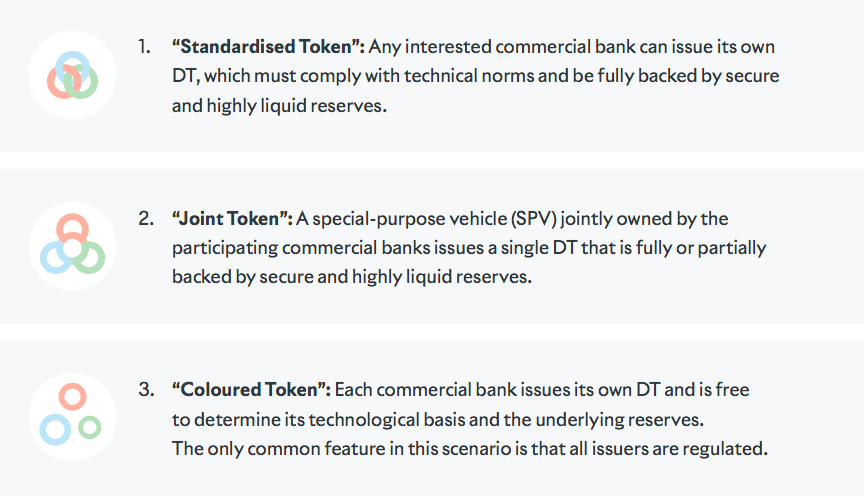Swiss Banks Join Forces for Blockchain-Based Deposit Token
With this initiative, the banks aim to modernize the Swiss financial system and increase its competitiveness in the digital age.

Leading Swiss banks – PostFinance, UBS, and Sygnum – have joined forces to explore the feasibility of a digital Swiss franc.
The initiative, spearheaded by the Swiss Bankers Association (Schweizerische Bankiervereinigung, or SBVg), aims to modernize Switzerland’s financial system and strengthen its competitive edge in the digital economy.
Blockchain-Based Digital Franc
The project, known as “Digitale Währungen”, or in English “Digital Currencies”, garnered support from large Swiss banks, which signed a memorandum of understanding (MoU) to jointly conduct a Proof of Concept (PoC) for a digital Swiss franc deposit token.
A deposit token, according to the MoU, is a blockchain-based payment method that mirrors traditional deposits. It allows bank customers to make transactions on a new and innovative payment platform using distributed ledger technology (DLT) and smart contracts .
 Three main types of the Deposit Token with different economic, legal and technical characteristics. Source: Swiss Bankers Association
Three main types of the Deposit Token with different economic, legal and technical characteristics. Source: Swiss Bankers Association
Initially, the Deposit Token PoC will focus on two use cases: simple payments between participating banks and delivery versus payment transactions with escrow functions.
A successful PoC, according to the Swiss Bankers Association, could pave the way for the widespread adoption of a digital Swiss franc, offering several benefits such as faster and cheaper transactions, enhanced security, and new financial products and services.
A Collaborative Effort
The MoU among the Swiss banks aims to address the need for coordination within the broader context of the Swiss Bankers Association’s work on digital currencies.
Firstly, the banks that signed the MoU intend to “design, execute and assess an initial Deposit Token PoC”.
Secondly, the banks will work together to address any legal or operational challenges that may arise during the project as well as evaluate the potential benefits and challenges of a nationwide rollout of a digital Swiss franc, considering “technical, legal, economic, risk, and operational factors.”
The Deposit Token PoC project is expected to be completed in 2025.
Blockchain-Powered Banking
In essence, PostFinance, UBS, and Sygnum are piloting a blockchain-based system to see if they can migrate customer deposits, which are fundamental to banking operations.
According to Remo Nyffenegger, an economist at the University of Basel, who commented on these plans for the Neue Zürcher Zeitung, this is a far more radical step than, for example, cantonal banks allowing their customers to invest in Bitcoin ( BTC ) and other digital assets. It’s more about banks using the underlying technology themselves or even building services directly on top of a public blockchain like Ethereum .
“As far as I know, this is the first time that deposit money has been issued directly on a blockchain. It’s a very innovative move by the Swiss banks.”
But there are significant regulatory hurdles to overcome, said Nyffenegger, such as determining the rules for cross-border use and the required backing of assets. “If they opt for a public blockchain, as suggested in their whitepaper , it would be truly revolutionary. Transactions on public blockchains are transparent to everyone.”
Swiss Banks Adopt Crypto Trading
In addition to the digital franc initiative, Swiss banks are also actively involved in cryptocurrency trading.
Zurich Cantonal Bank (known locally as Zürcher Kantonalbank, or ZKB), one of the largest banks in Switzerland , has become the latest financial institution to offer cryptocurrency trading services to its customers. Starting on Sept. 4, ZKB customers are able to trade Bitcoin and Ether ( ETH ) around the clock directly through the ZKB eBanking or ZKB Mobile Banking platforms.
Ab heute ermöglicht die Zürcher Kantonalbank den Handel und die sichere Verwahrung von #Bitcoin und #Ethereum . Das Angebot ist nahtlos in die bestehenden Kanäle integriert und richtet sich gleichermassen an Kundinnen und Kunden sowie an Drittbanken: https://t.co/IbKw9o1aqk pic.twitter.com/1CjPS1A3Mg
— Zürcher Kantonalbank (@zkb_ch) September 4, 2024
In recent months, several Swiss cantonal (government-owned commercial) banks, including Zuger Kantonalbank , St. Galler Kantonalbank , and Luzerner Kantonalbank , have also successfully launched cryptocurrency services.
Disclaimer: The content of this article solely reflects the author's opinion and does not represent the platform in any capacity. This article is not intended to serve as a reference for making investment decisions.
You may also like
After Trump’s big move, DeFi just got a whole lot freer
Altcoin Bulls Hold Strong Despite Bearish Sentiment
While 90% turn bearish, altcoin believers say the best of the cycle is still ahead.Bullish Hope in a Bearish CrowdWhy the Altcoin Market Feels Weak Right NowThe Opportunity Behind the Fear

DWF Labs Partners: Hold USD1 to get Falcon Finance closed beta test qualification
DWF Labs Partner: $250 million liquidity fund currently has $184 million left
